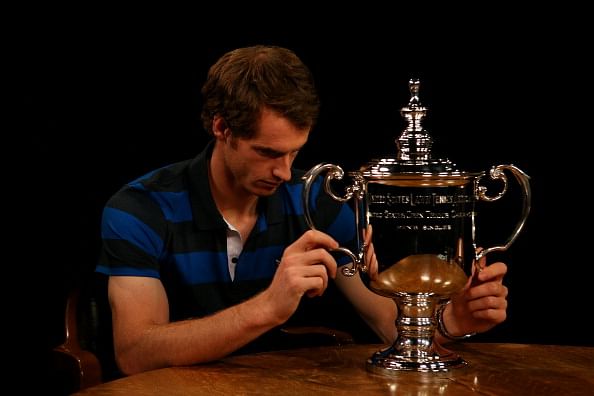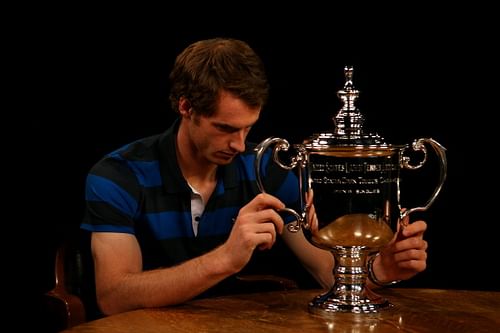
Murray embraces victory to emancipate a nation

NEW YORK, NY – SEPTEMBER 11: Andy Murray of Great Britain poses with the US Open Championship trophy as he takes part in a New York City trophy tour after his victory in in the 2012 US Open Championship final in Central Park on September 11, 2012 in New York City. (Photo by Clive Brunskill/Getty Images)
On a wickedly windy evening inside a cauldron of dreams in New York, Andy Murray dug deep and found the spirit needed to exorcise the lingering shadow of Fred Perry that has burdened the besieged Scot throughout his arduous career. Exactly seventy-nine years to the day since Perry first won the US Open, Murray scripted an almost heroic 7-6 (12-10), 7-5, 2-6, 3-6, 6-2 victory over Novak Djokovic in an exacting battle that lasted an excruciating 4 hours and 54 minutes. If the quality of tennis was found wanting during the final, the intense human drama more than made up for it as Murray set about unlocking the millstone that has hung heavy for as long as the Scot can remember.
It was the third Monday for a fifth-straight year at Flushing Meadows, but Murray surely wasn’t among the lot that spent Sunday in a sea of complaints. It was Murray’s fifth Grand Slam final and the elusive taste of success meant that he enjoyed the extra day off with a screening of the Wedding Crashers to relax his nerve ahead of the battle against Djokovic. The Serbian is already a five-time Grand Slam winner and stood in the way of Murray and his much awaited date with destiny. With so many things five doing the rounds, it was only fitting that the match lasted nearly five hours before Murray prevailed over pain and pressure in five sets.
Incidentally, Murray’s coach had also lost his first four major finals before winning an impressive eight Grand Slam titles in a career made remarkable by the man’s unrelenting consistency and dogged determination. Considering the eight consecutive finals Ivan Lendl, the Czech stalwart made at the US Open during his career, he must have professed more than the ordinary insight to help his ward succeed on those very courts. However, being in possession of just insights wasn’t going to be enough, not against a gladiator like Djokovic. Murray learnt it the hard way at the end of a 54-stroke rally in the sixth game, which just underlined the intense hard work it might take to snatch the crown away from the defending champion.
And it took a lot of time too. Just the first set lasted an endless hour and 27 minutes during which both Murray and Djokovic battled not just their forehand and backhand, but also the swirling winds that were making the ball slide and curl like a man in a drunken stupor. In fact the furiously fluttering flags made the stadium look like a sail boat in the middle of an ugly storm. It was soon becoming clear that the man in front was going to be the one that could stick out his racket like an oar and keep from steering off course.
The conditions in a way worked to the advantage of Murray, who lives and dies retrieving the next ball to the point of vexing his opponent. With the ball playing the odd trick, Djokovic was being forced to run sideways and then stretch some expending valuable energy even as his opponent was using the slice to his advantage. The Serbian is far more comfortable skinning the leather off the ball with his attacking groundstrokes, but the wind drew him into a tentative shell that prevented the world No.2 from bringing his impressive repertoire of strokes to bear on the rallies. When the first set ended 12-10 in favour of Murray on his sixth set point, it seemed like a mini match in itself.
A deflated Djokovic went completely missing at the beginning of the second set, almost like an earlier avatar of himself that gave in all too often. But Djokovic has since steeled himself into a fierce fighter and it came as no surprise when rallied back from 0-4 to catch the Scot at 5-5. It appeared that the momentum had swung away from Murray – a loss in another Grand Slam final might have been a body blow to the career of the Scot. Since the beginning of the Australian Open though, where Lendl joined forces, Murray has displayed increasing resolve – so much so that many consider his valiant five-hour battle against Djokovic in the Melbourne semifinal among the best matches of the Scot’s career even if he lost it. He used some of that spirit to good effect to regroup and break the Serbian in the twelfth game to take the second set. Murray had been a meagre presence in all his previous four finals – winning just one set; now he had double the count.
Djokovic though is a mean fighter himself, as evidenced in those monstrous comebacks against Roger Federer in the past two years. Just when it appeared that he might be bounced out unceremoniously, Djokovic found an early break and set about repairing his situation. It was always a tough ask – no man since Pancho Gonzalez in 1949 had done the Houdini in New York – to win from two sets down. But the Serbian’s rise to the top has often been punctuated by impossible effort and steely nerve.
As the Serbian wove himself into the fabric of the final, Murray’s first serve deserted its puzzled master – dropping to an alarming 45% in the fourth set. It was not as if Djokovic would spurn such an obvious invitation to the biggest party in town. The match was even by now, but every point was turning into an expression of laboured effort for survival. It was after all a match characterised more by attrition than by sustained brilliance. By then it was a question of whether it will be the burden of history that wears out Murray or if it is the exertion on the day that would get the better of Djokovic.
The answers came thick and fast, as Murray raced away to a 3-0 lead in the deciding set. He must have begun to almost smell the sweet aroma of his maiden Grand Slam title. Djokovic mustered one final gasp of resistance to remain with Murray by winning the next two games. But Murray steadied his nerves one last time to stave off the resolute Serbian and take a leap of faith that saw him seal victory to finally lift the first grand slam trophy of his career.
When he was done, Murray barely had the juice to stand up. He let his racket go, slumping down on his haunches as the enormity of the occasion started to weigh him down even as it liberated him from the burden of a lifetime. In a country shorn of Grand Slam success for 76 long years, Murray’s momentous triumph will go a long way not just in laying to rest the hovering spirit of Perry but also ignite the dreams of a generation of British kids who might wish to script their own tennis celebration.